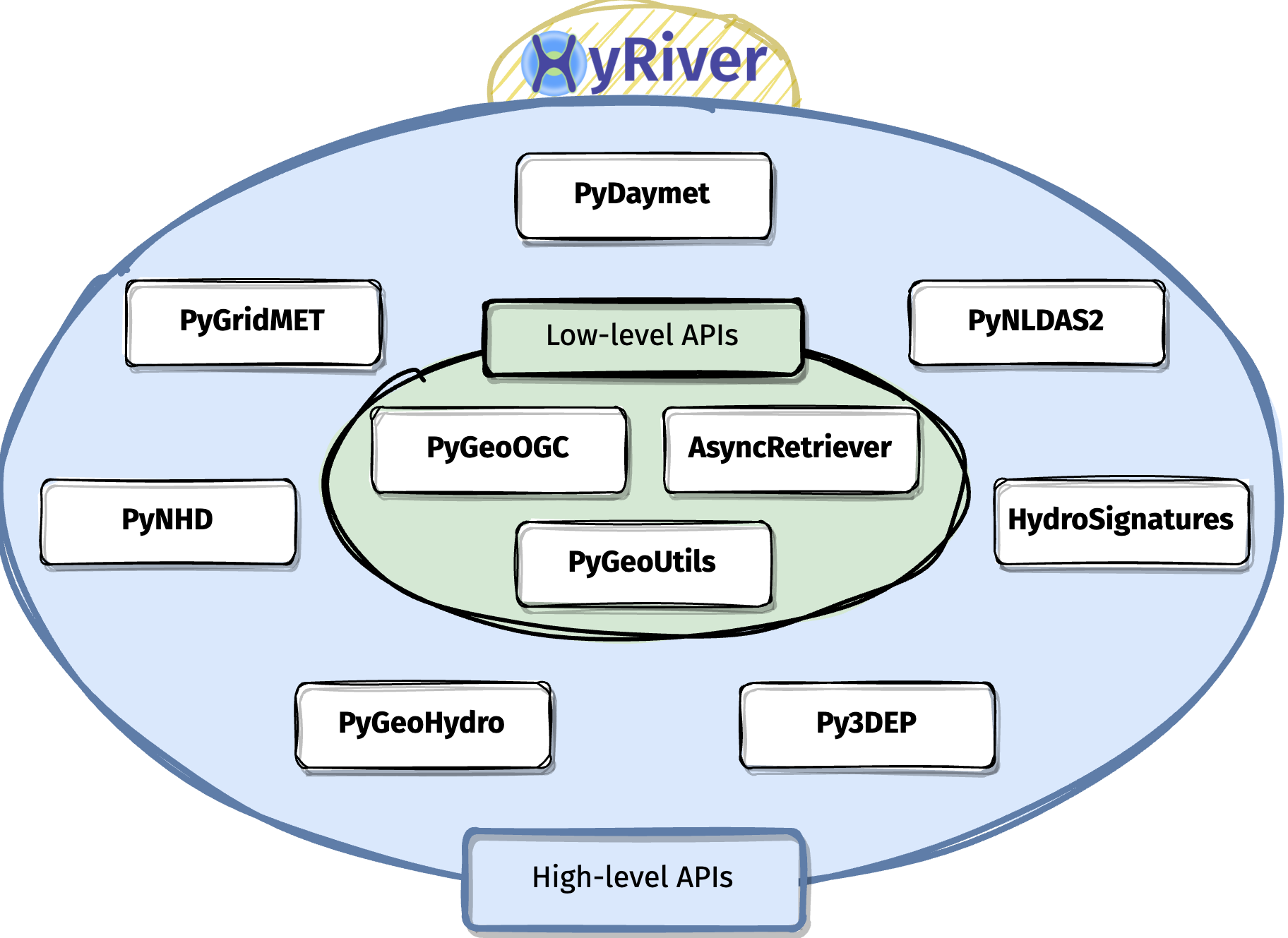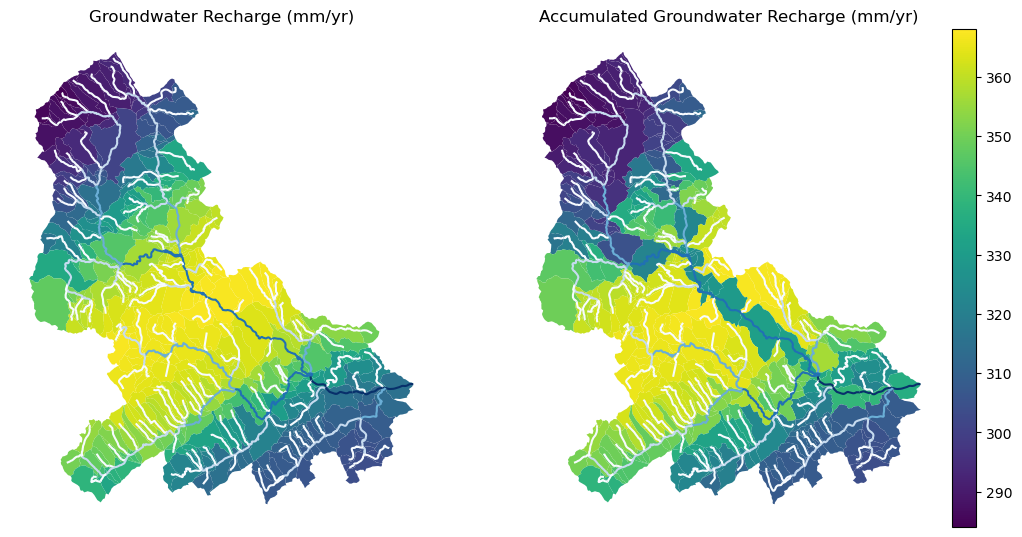Hi! I'm trying to run the notebook example that uses HYMOD and HyRiver packages for hydrological modelling. I changed the station ID to another station of my interest, and I changed the dates for a longer period than the one in the example. I'm getting the following error when I try to compute the PET using the method hargreaves_samani:
---------------------------------------------------------------------------
OperationalError Traceback (most recent call last)
Cell In [14], line 1
----> 1 clm = daymet.get_bygeom(basin.geometry[0], dates, variables="prcp", pet="hargreaves_samani")
File /usr/local/lib/python3.10/site-packages/pydaymet/pydaymet.py:467, in get_bygeom(geometry, dates, crs, variables, region, time_scale, pet, pet_params, snow, snow_params, ssl)
453 urls, kwds = zip(
454 *_gridded_urls(
455 daymet.time_codes[time_scale],
(...)
460 )
461 )
463 try:
464 clm: xr.Dataset = xr.open_mfdataset(
465 ( # type: ignore
466 io.BytesIO(r)
--> 467 for r in ar.retrieve_binary(urls, request_kwds=kwds, max_workers=MAX_CONN, ssl=ssl)
468 ),
469 engine="scipy",
470 coords="minimal",
471 )
472 except ValueError as ex:
473 msg = (
474 "The service did NOT process your request successfully. "
475 + "Check your inputs and try again."
476 )
File /usr/local/lib/python3.10/site-packages/async_retriever/async_retriever.py:496, in retrieve_binary(urls, request_kwds, request_method, max_workers, cache_name, timeout, expire_after, ssl, disable)
454 def retrieve_binary(
455 urls: Sequence[StrOrURL],
456 request_kwds: Optional[Sequence[Dict[str, Any]]] = None,
(...)
463 disable: bool = False,
464 ) -> List[bytes]:
465 r"""Send async requests and get the response as ``bytes``.
466
467 Parameters
(...)
494 List of responses in the order of input URLs.
495 """
--> 496 resp: List[bytes] = retrieve( # type: ignore
497 urls,
498 "binary",
499 request_kwds,
500 request_method,
501 max_workers,
502 cache_name,
503 timeout,
504 expire_after,
505 ssl,
506 disable,
507 )
508 return resp
File /usr/local/lib/python3.10/site-packages/async_retriever/async_retriever.py:246, in retrieve(urls, read_method, request_kwds, request_method, max_workers, cache_name, timeout, expire_after, ssl, disable)
242 chunked_reqs = tlz.partition_all(max_workers, inp.url_kwds)
244 results = (loop.run_until_complete(session(url_kwds=c)) for c in chunked_reqs)
--> 246 resp = [r for _, r in sorted(tlz.concat(results))]
247 if new_loop:
248 loop.close()
File /usr/local/lib/python3.10/site-packages/async_retriever/async_retriever.py:244, in <genexpr>(.0)
230 session = tlz.partial(
231 async_session,
232 read=inp.read_method,
(...)
239 disable=disable,
240 )
242 chunked_reqs = tlz.partition_all(max_workers, inp.url_kwds)
--> 244 results = (loop.run_until_complete(session(url_kwds=c)) for c in chunked_reqs)
246 resp = [r for _, r in sorted(tlz.concat(results))]
247 if new_loop:
File /usr/local/lib/python3.10/site-packages/nest_asyncio.py:90, in _patch_loop.<locals>.run_until_complete(self, future)
87 if not f.done():
88 raise RuntimeError(
89 'Event loop stopped before Future completed.')
---> 90 return f.result()
File /usr/local/lib/python3.10/asyncio/futures.py:201, in Future.result(self)
199 self.__log_traceback = False
200 if self._exception is not None:
--> 201 raise self._exception.with_traceback(self._exception_tb)
202 return self._result
File /usr/local/lib/python3.10/asyncio/tasks.py:232, in Task.__step(***failed resolving arguments***)
228 try:
229 if exc is None:
230 # We use the `send` method directly, because coroutines
231 # don't have `__iter__` and `__next__` methods.
--> 232 result = coro.send(None)
233 else:
234 result = coro.throw(exc)
File /usr/local/lib/python3.10/site-packages/async_retriever/async_retriever.py:92, in async_session(url_kwds, read, r_kwds, request_method, cache_name, timeout, expire_after, ssl, disable)
87 request_func = getattr(session, request_method.lower())
88 tasks = (
89 utils.retriever(uid, url, kwds, request_func, read, r_kwds)
90 for uid, url, kwds in url_kwds
91 )
---> 92 return await asyncio.gather(*tasks)
File /usr/local/lib/python3.10/asyncio/tasks.py:304, in Task.__wakeup(self, future)
302 def __wakeup(self, future):
303 try:
--> 304 future.result()
305 except BaseException as exc:
306 # This may also be a cancellation.
307 self.__step(exc)
File /usr/local/lib/python3.10/asyncio/tasks.py:232, in Task.__step(***failed resolving arguments***)
228 try:
229 if exc is None:
230 # We use the `send` method directly, because coroutines
231 # don't have `__iter__` and `__next__` methods.
--> 232 result = coro.send(None)
233 else:
234 result = coro.throw(exc)
File /usr/local/lib/python3.10/site-packages/async_retriever/utils.py:62, in retriever(uid, url, s_kwds, session, read_type, r_kwds)
30 async def retriever(
31 uid: int,
32 url: StrOrURL,
(...)
36 r_kwds: Dict[str, None],
37 ) -> Tuple[int, Union[str, Awaitable[Union[str, bytes, Dict[str, Any]]]]]:
38 """Create an async request and return the response as binary.
39
40 Parameters
(...)
60 The retrieved response as binary.
61 """
---> 62 async with session(url, **s_kwds) as response:
63 try:
64 return uid, await getattr(response, read_type)(**r_kwds)
File /usr/local/lib/python3.10/site-packages/aiohttp/client.py:1141, in _BaseRequestContextManager.__aenter__(self)
1140 async def __aenter__(self) -> _RetType:
-> 1141 self._resp = await self._coro
1142 return self._resp
File /usr/local/lib/python3.10/site-packages/forge/_revision.py:322, in Revision.__call__.<locals>.inner(*args, **kwargs)
318 @functools.wraps(callable)
319 async def inner(*args, **kwargs):
320 # pylint: disable=E1102, not-callable
321 mapped = inner.__mapper__(*args, **kwargs)
--> 322 return await callable(*mapped.args, **mapped.kwargs)
File /usr/local/lib/python3.10/site-packages/aiohttp_client_cache/session.py:62, in CacheMixin._request(self, method, str_or_url, expire_after, **kwargs)
60 actions.update_from_response(new_response)
61 if await self.cache.is_cacheable(new_response, actions):
---> 62 await self.cache.save_response(new_response, actions.key, actions.expires)
63 return set_response_defaults(new_response)
File /usr/local/lib/python3.10/site-packages/aiohttp_client_cache/backends/base.py:169, in CacheBackend.save_response(self, response, cache_key, expires)
167 cache_key = cache_key or self.create_key(response.method, response.url)
168 cached_response = await CachedResponse.from_client_response(response, expires)
--> 169 await self.responses.write(cache_key, cached_response)
171 # Alias any redirect requests to the same cache key
172 for r in response.history:
File /usr/local/lib/python3.10/site-packages/aiohttp_client_cache/backends/sqlite.py:189, in SQLitePickleCache.write(self, key, item)
188 async def write(self, key, item):
--> 189 await super().write(key, sqlite3.Binary(self.serialize(item)))
File /usr/local/lib/python3.10/site-packages/aiohttp_client_cache/backends/sqlite.py:170, in SQLiteCache.write(self, key, item)
168 async def write(self, key: str, item: Union[ResponseOrKey, sqlite3.Binary]):
169 async with self.get_connection(autocommit=True) as db:
--> 170 await db.execute(
171 f'INSERT OR REPLACE INTO `{self.table_name}` (key,value) VALUES (?,?)',
172 (key, item),
173 )
File /usr/local/lib/python3.10/site-packages/aiosqlite/core.py:184, in Connection.execute(self, sql, parameters)
182 if parameters is None:
183 parameters = []
--> 184 cursor = await self._execute(self._conn.execute, sql, parameters)
185 return Cursor(self, cursor)
File /usr/local/lib/python3.10/site-packages/aiosqlite/core.py:129, in Connection._execute(self, fn, *args, **kwargs)
125 future = asyncio.get_event_loop().create_future()
127 self._tx.put_nowait((future, function))
--> 129 return await future
File /usr/local/lib/python3.10/asyncio/futures.py:285, in Future.__await__(self)
283 if not self.done():
284 self._asyncio_future_blocking = True
--> 285 yield self # This tells Task to wait for completion.
286 if not self.done():
287 raise RuntimeError("await wasn't used with future")
File /usr/local/lib/python3.10/asyncio/tasks.py:304, in Task.__wakeup(self, future)
302 def __wakeup(self, future):
303 try:
--> 304 future.result()
305 except BaseException as exc:
306 # This may also be a cancellation.
307 self.__step(exc)
File /usr/local/lib/python3.10/asyncio/futures.py:201, in Future.result(self)
199 self.__log_traceback = False
200 if self._exception is not None:
--> 201 raise self._exception.with_traceback(self._exception_tb)
202 return self._result
File /usr/local/lib/python3.10/site-packages/aiosqlite/core.py:102, in Connection.run(self)
100 try:
101 LOG.debug("executing %s", function)
--> 102 result = function()
103 LOG.debug("operation %s completed", function)
105 def set_result(fut, result):
OperationalError: database is locked













